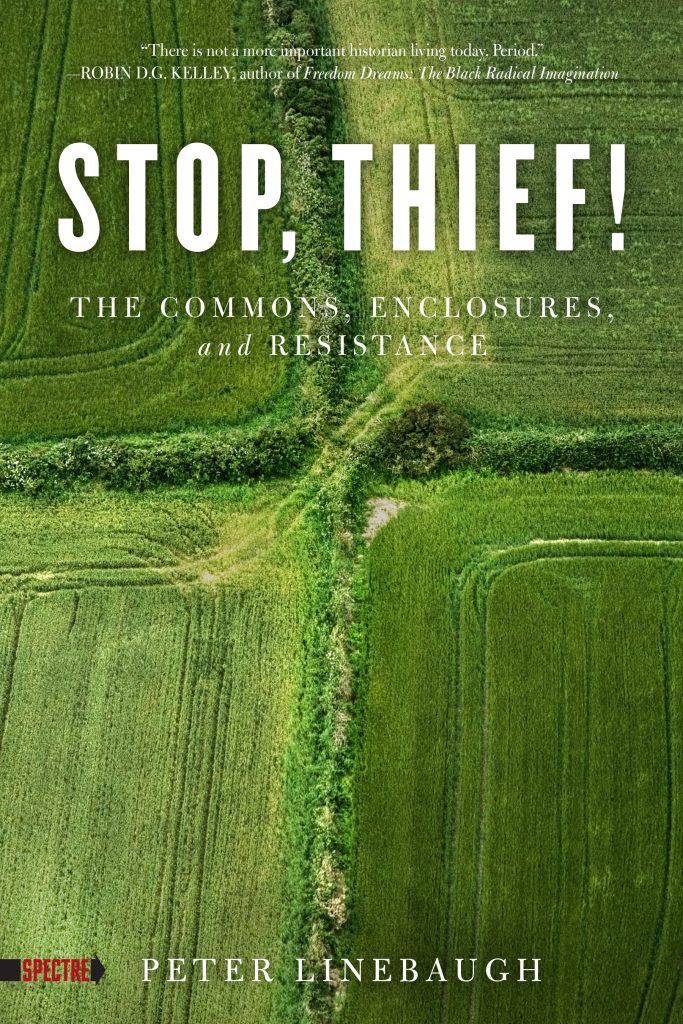by Martin Parker
Anarchist Studies 23-1
According to Peter Linebaugh, if a radical speaker wanted to get attention in the hurly burly of a street, one tactic was to shout ‘stop thief!’ loudly and repeatedly until a crowd gathered and began to pay attention. In this megaphone of a book, we are reminded just how much thieving has been going on, and for how long. In its dense series of interconnected essays, most published elsewhere but definitely benefit- ting from their collection here, the theme of enclosures and commons is repeated in different places and times until we can be in no doubt that the argument is a general one. Thieves have been stealing our stuff for a long while now, and it’s time to start noticing and doing something about it.
We don’t need to run through the general features of the commons argument here, but it’s worth making one point clear. For Linebaugh, commoning is a rela- tionship (p 18), and ‘the commons’ is something produced by that relationship. It’s important to bear that in mind when reading these essays, because otherwise we would easily end up in a series of unhelpful dichotomies. For example, the wide open spaces of the country ended by the confinements of the city; the field replaced by the factory; and freedom by institutions. Though Linebaugh is often enough a romantic when it comes to wild flowers and long walks, he knows that ‘the city itself must be commonized’ (p 40).
The essays here touch on topics which will be familiar to those who know Peter Linebaugh’s work – crime, Marx, history, romanticism, slavery, women in men’s clothing and vice versa – a list of all the ways in which the word ‘common’ becomes a slur in the English language. This books adds Godzilla, cowboys, witches and the importance of rest ‘because earth, air, water and fire, formerly common, are utterly exhausted by the world’s privatizers who call their exploitation “business”. But business is the opposite of rest.’ (p 135)
It’s a tremendous book, bursting with astonishing detail, bizarre entanglements, autobiographical excursions and firebrand rhetoric. It is a most ill-disciplined read too, one that refuses to stay within its constituent disciplines – history and politics – and that instead oscillates between Ripley’s ‘Believe It or Not’ scholarship and a tub thumping condemnation of the present. Circumnavigating the shores of the Atlantic, Linebaugh forces his readers to think about communing, communism and the deep tides of history that connect ‘then’ with ‘now’. It’s a great read.
This leaves questions, of course, because as Linebaugh says ‘in true dialectics … each party in the discussion is changed by it’ (p 255). So sometimes, as I read, I wondered what the boundaries of this commons might be. As someone who is interested in organisations, I began to wonder whether Linebaugh would regard all institutions as enclosures, as attempts to channel and restrict the flows of human action. As we might expect from a thunderer on a soapbox, variants of good commons and bad enclosures are conjured with enthusiasm, but there is little reflection on what a more relational account of this politics might look like. In other words, could we consider what sorts of enclo- sures are good and useful, and what sorts of commons might be a problem? For example, when he describes the division of labour as a form of enclosure (p 80), does that mean that any allocation of tasks to different people is an offence to the commons? I hope he wouldn’t argue that, and that the sort of radical history and explosive writing that this book encloses can be turned to the practical business of building the future, as well as re-telling the past for a crowd who will probably roar their agreement anyway.







